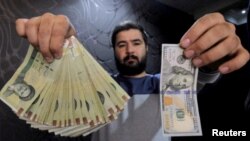Western news agencies say the Iranian rial has weakened significantly against the dollar in black market trading following the U.S. decision to exit the 2015 Iran nuclear deal.
Published reports say the rial has been quoted as low as 80,000 to 90,000 against the dollar on the black market since the U.S. exit from the deal was announced Tuesday. Reuters says the black market rate was around 65,000 rials to the dollar just before that announcement.
Iran fixed its exchange rate at 42,000 to the dollar last month, combining its official and "free-market" exchange rates into one rate and criminalizing trade at any other levels.
But Iranian public demand for dollars has remained higher than the levels supplied through official currency exchanges, prompting "free-market" trade to continue as black market transactions, some of them online. The rise in the black market cost of dollars makes it more expensive for Iranians to travel abroad and buy dollar-denominated goods and services.
Iranian American economist Siamak Shojai, based at William Paterson University in New Jersey, told VOA Persian’s NewsHour program on Thursday that the rial’s slump is largely a result of Iranian government mismanagement of the economy and Iranian involvement in regional conflicts. He said Iranians also were buying dollars because the U.S. departure from the Iran nuclear deal and its re-imposition of sanctions on Iran’s oil industry may lead to a decline in Iranian oil sales — one of Tehran’s main revenue sources.
This report was produced in collaboration with VOA’s Persian Service.




